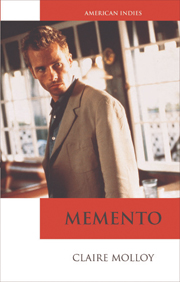Book contents
- Frontmatter
- Contents
- Series Preface
- Acknowledgements
- Dedication
- Introduction: Memento
- 1 Memento and Independent Cinema: A Seductive Business
- 2 Searching for a Slam Dunk: Marketing Memento
- 3 Puzzle Films, Ambiguity and Technologically-enabled Narrative
- 4 Memento as Noir
- 5 So What Really Happened? Memento, Fans and Online Interpretive Strategies
- Notes
- Bibliography
- Index
2 - Searching for a Slam Dunk: Marketing Memento
Published online by Cambridge University Press: 05 August 2013
- Frontmatter
- Contents
- Series Preface
- Acknowledgements
- Dedication
- Introduction: Memento
- 1 Memento and Independent Cinema: A Seductive Business
- 2 Searching for a Slam Dunk: Marketing Memento
- 3 Puzzle Films, Ambiguity and Technologically-enabled Narrative
- 4 Memento as Noir
- 5 So What Really Happened? Memento, Fans and Online Interpretive Strategies
- Notes
- Bibliography
- Index
Summary
They're searching for the indie equivalent of a slam dunk … But I think there's always a way to sell a good movie. And this one's not esoteric – it's a murder-mystery!
Christopher Nolan.That Memento struggled to find domestic distribution revealed certain assumptions that distributors held about independent film and its audiences at the beginning of the twenty-first century. US distributors had concerns that American audiences would find the narrative difficult to understand and that Memento would be an especially difficult film to market. This had not been the case with European distributors, many of which had bought rights at the script stage. Summit Entertainment, which had a long-standing partnership arrangement with Newmarket, had been successful in securing pre-sales in European territories which covered $4.5 million of the initial $5 million production costs on the strength of the screenplay alone. However, US distributors were convinced that Memento would not be appropriate for their audiences, claiming that it was ‘too smart’ and suggesting instead that the film was more suited to a European market already culturally predisposed to art-house films. The response reflected a general feeling on the part of US distributors that Memento leant too far towards the art-house end of the independent spectrum and highlighted the extent to which American distributors had become cautious about niche films, and were looking instead for independent films with a strong potential for crossover success.
- Type
- Chapter
- Information
- Memento , pp. 26 - 44Publisher: Edinburgh University PressPrint publication year: 2010



